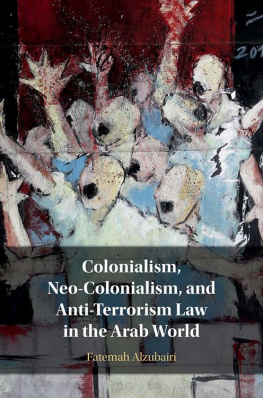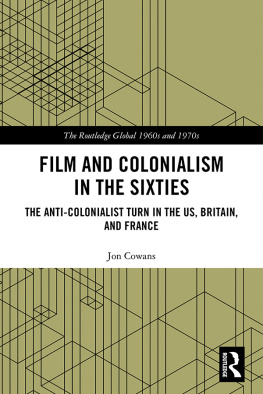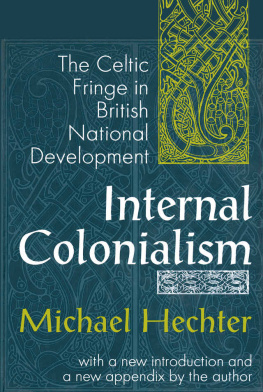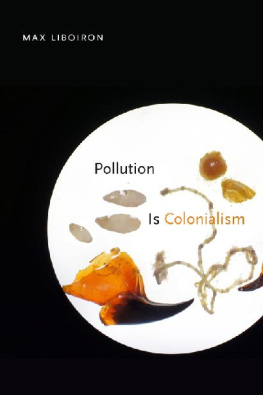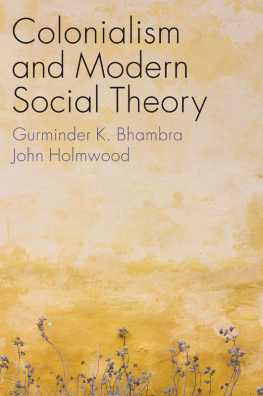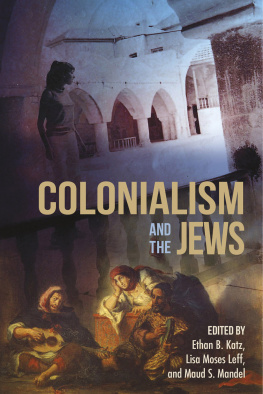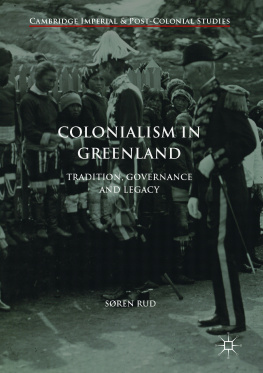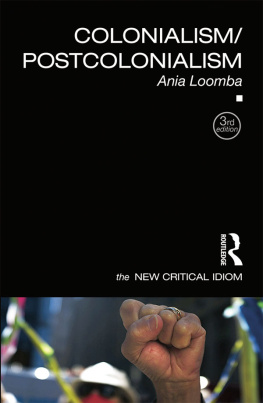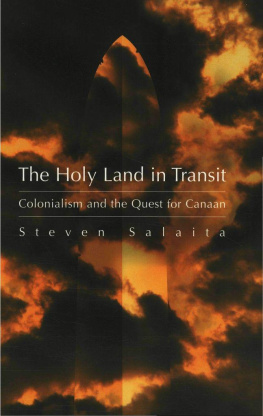Césaire - Discourse on Colonialism
Here you can read online Césaire - Discourse on Colonialism full text of the book (entire story) in english for free. Download pdf and epub, get meaning, cover and reviews about this ebook. year: 1972, publisher: New York University Press, genre: Politics. Description of the work, (preface) as well as reviews are available. Best literature library LitArk.com created for fans of good reading and offers a wide selection of genres:
Romance novel
Science fiction
Adventure
Detective
Science
History
Home and family
Prose
Art
Politics
Computer
Non-fiction
Religion
Business
Children
Humor
Choose a favorite category and find really read worthwhile books. Enjoy immersion in the world of imagination, feel the emotions of the characters or learn something new for yourself, make an fascinating discovery.

Discourse on Colonialism: summary, description and annotation
We offer to read an annotation, description, summary or preface (depends on what the author of the book "Discourse on Colonialism" wrote himself). If you haven't found the necessary information about the book — write in the comments, we will try to find it.
Discourse on Colonialism — read online for free the complete book (whole text) full work
Below is the text of the book, divided by pages. System saving the place of the last page read, allows you to conveniently read the book "Discourse on Colonialism" online for free, without having to search again every time where you left off. Put a bookmark, and you can go to the page where you finished reading at any time.
Font size:
Interval:
Bookmark:
Thank you for buying this ebook, published by NYU Press.
Sign up for our e-newsletters to receive information about forthcoming books, special discounts, and more!
Sign Up!
A publisher of original scholarship since its founding in 1916, New York University Press Produces more than 100 new books each year, with a backlist of 3,000 titles in print. Working across the humanities and social sciences, NYU Press has award-winning lists in sociology, law, cultural and American studies, religion, American history, anthropology, politics, criminology, media and communication, literary studies, and psychology.
DISCOURSE ON COLONIALISM
Aim Csaire
Translated by Joan Pinkham
A POETICS OF ANTICOLONIALISM
by Robin D. G. Kelley

Copyright 1972, 2000 by Monthly Review Press
All Rights Reserved
Originally published as Discours sur le colonialisme by Prsence Africaine,
Copyright 1955 by Editions Prsence Africaine
Library of Congress Cataloging-in-Publication Data
Csaire Aim.
[Discours sur le colonialisme. English]
Discourse on colonialism / Aim Csaire; translated by Joan Pinkham.
A poetics of anticolonialism / Robin D.G. Kelley.
p. cm.
Contents: A poetics of anticolonialism / Robin D.G. Kelley
Discourse on colonialism / Aim Csaire An interview with Aim Csaire/
Ren Depestre.
ISBN-13 978-1-58367-025-5
1. Colonies. 2. ColoniesAfrica. 3. Postcolonialism. I. Kelley, Robin D.G. Poetics of anticolonialism. II. Title: Poetics of anticolonialism. III. Title.
JV51 .C413 2000
325.3dc21
00-020238
CIP
Monthly Review Press
146 W. 29th Street, 6-W
New York, NY 10001
10 9 8
Robin D.G. Kelley
Aim Csaire
RenDepestre
Robin D.G. Kelley
Aim Csaires Discourse on Colonialism might be best described as a declaration of war. I would almost call it a third world manifesto, but hesitate because it is primarily a polemic against the old order bereft of the kind of propositions and proposals that generally accompany manifestos. Yet, Discourse speaks in revolutionary cadences, capturing the spirit of its age just as Marx and Engels did 102 years earlier in their little manifesto. First published in 1950 as Discours sur le colonialisme, it appeared just as the old empires were on the verge of collapse, thanks in part to a world war against fascism that left Europe in material, spiritual, and philosophical shambles.Bandung, Indonesia, to discuss the freedom and future of the third world. Maos revolution in China was a year old, while the Mau Mau in Kenya were just gearing up for an uprising against their colonial masters. The French encountered insurrections in Algeria, Tunisia, Morocco, Cameroon, and Madagascar, and suffered a humiliating defeat by the Viet Minh at Dien Bien Phu. Revolt was in the air. India, the Philippines, Guyana, Egypt, Guatemala, South Africa, Alabama, Mississippi, Georgia, Harlem, you name it. Revolt! Malcolm X once described this extraordinary moment, this long decade from the end of the Second World War to the late 1950s, as a tidal wave of color.
Discourse on Colonialism is indisputably one of the key texts in this tidal wave of anticolonial literature produced during the postwar periodworks that include W.E.B. Du Boiss Color and Democracy (1945) and The World and Africa (1947), Frantz Fanons Black Skin, White Masks (1952), George Padmores Pan-Africanism or Communism?: The Coming Struggle for Africa (1956), Albert Memmis The Colonizer and the Colonized (1957), Richard Wrights White Man Listen! (1957), Jean-Paul Sartres essay, Black Orpheus (1948), and journals such as Prsence Africaine and African Revolution. Like much of the radical literature produced during this epoch, Discourse places the colonial question front and center. Although Csaire, remaining somewhat true to his Communist affiliation, never quite dethrones the modern proletariat from its exalted status as a revolutionary force, the European working class is practically invisible. This is a book about colonialism, its impact on the colonized, on culture, on history, on the very concept of civilization itself, and most importantly, on the colonizer. In the finest Hegelian fashion, Csaire demonstrates how colonialism works to decivilize the colonizer: torture, violence, race hatred, and immorality constitute a dead weight on the so-called civilized, pulling the master class deeper and deeper into the abyss of barbarism. The instruments of colonial power rely on barbaric, brutal violence and intimidation, and the end result is the degradation of Europe itself. Hence Csaire can only scream: Europe is indefensible.
Europe is also dependent. Anticipating Fanons famous proposition that Europe is literally the creation of the Third World, Csaire reveals, over and over again, that the colonizers sense of superiority, their sense of mission as the worlds civilizers, depends on turning the Other into a barbarian. The Africans, the Indians, the Asians cannot possess civilization or a culture equal to that of the imperialists, or the latter have no purpose, no justification for the exploitation and domination of the rest of the world. The colonial encounter, in other words, requires a reinvention of the colonized, the deliberate destruction of the pastwhat Csaire calls thingification. Discourse, then, has a double-edged meaning: it is Csaires discourse on the material and spiritual havoc created by colonialism, and it is a critique of colonial discourse. Anticipating the explosion of work we now call postcolonial studies, Csaires critique of figures such as Dominique O. Mannoni, Roger Caillois, Ernest Renan, Yves Florenne, and Jules Romains, among others, reveals how the circulation of colonial ideologyan ideology of racial and cultural hierarchyis as essential to colonial rule as police and corve labor.
Surprisingly, few assessments of postcolonial criticism pay much attention to Discourse, besides mentioning it in a litany of pioneering works without bothering to elaborate on its contents. Robert Youngs White Mythologies: Writing History and the West (1990) dates the origins of postcolonial studies to Fanons Wretched of the Earth, despite the fact that some of the arguments in Fanon were I want to suggest that Discourse made some critical contributions to our thinking about colonialism, fascism, and revolution. First, its recasting of the history of Western Civilization helps us locate the origins of fascism within colonialism itself; hence, within the very traditions of humanism, critics believed fascism threatened. Second, Csaire was neither confused about Marxism nor masquerading as a Marxist when he wrote Discourse. On the contrary, he was attempting to revise Marx, along the lines of his predecessors such as W.E.B. Du Bois and M.N. Roy, by suggesting that the anticolonial struggle supersedes the proletarian revolution as the fundamental historical movement of the period. The implications are enormous: the coming revolution was not posed in terms of capitalism versus socialism (the very last paragraph notwithstanding, but we shall return to this later), but in terms of the complete and total overthrow of a racist, colonialist system that would open the way to imagine a whole new world.
Next pageFont size:
Interval:
Bookmark:
Similar books «Discourse on Colonialism»
Look at similar books to Discourse on Colonialism. We have selected literature similar in name and meaning in the hope of providing readers with more options to find new, interesting, not yet read works.
Discussion, reviews of the book Discourse on Colonialism and just readers' own opinions. Leave your comments, write what you think about the work, its meaning or the main characters. Specify what exactly you liked and what you didn't like, and why you think so.

